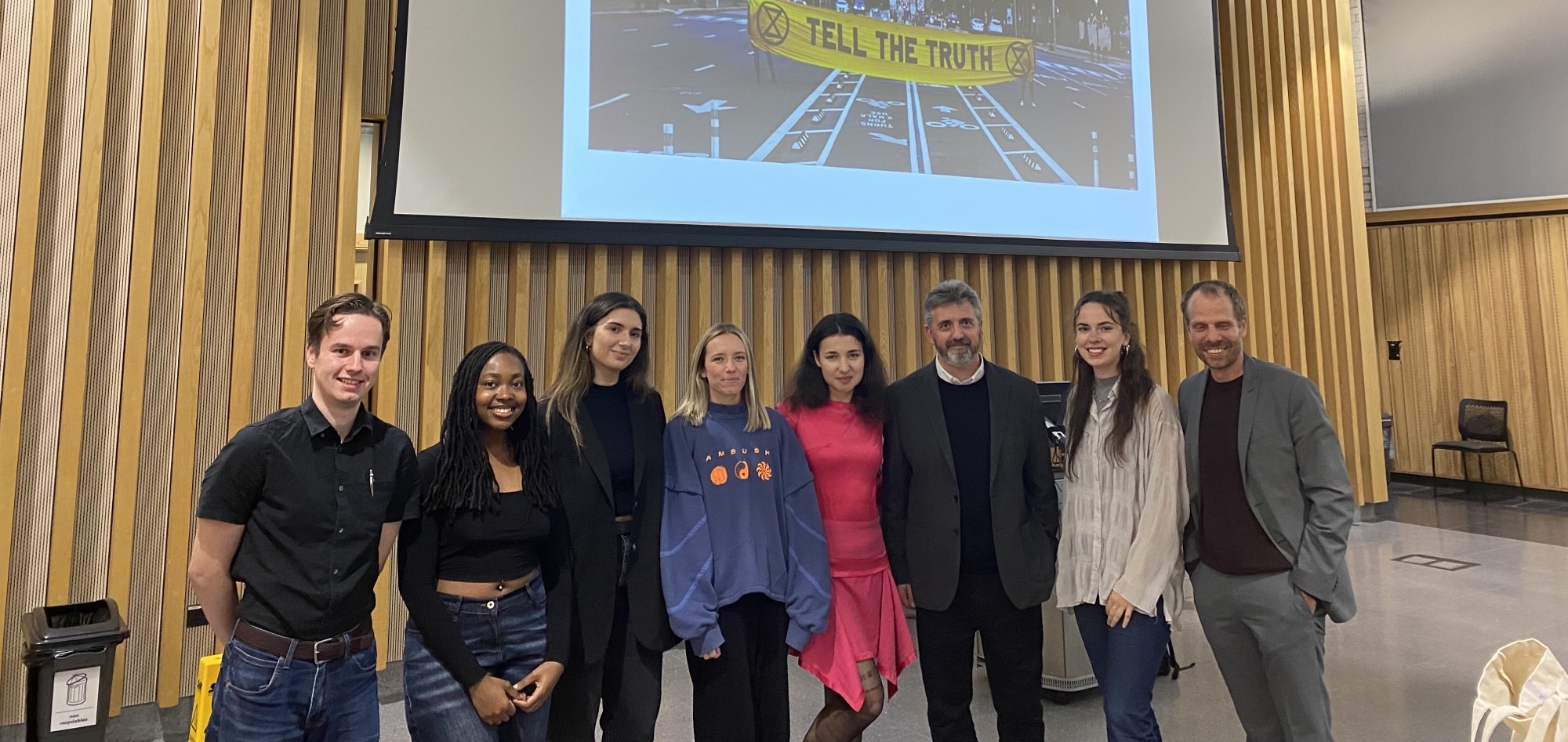Decisive Decade: Intergenerational Justice and Equity
“As a matter of public discourse, the geopolitical disaster has been facilitated by the fact that the current generation in the developed countries has spent much of the last two decades conveniently distracted and confused about the problem. […]. The catastrophic potential of the ecological crisis seems difficult to explain away in any normal way. Unfortunately, in a perfect moral storm, it makes perfect sense. The temptation to pass the buck on to the future, the poor, and nature is very strong. So, the incentive to disengage is high.”
(Gardiner, A Perfect Moral Storm, p. 9)
In October 2022, we had the pleasure of welcoming Professor Stephen Gardiner to Newcastle University to discuss the pressing matter of intergenerational justice and equity with our student co-researchers. As a higher education institution accompanying students as they begin their journey of discovery as researchers, intergenerational justice and equity are at the heart of our mission. Our interdisciplinary team of student research interns worked together over two months, engaging closely with Stephen Gardiner’s field-leading work on intergenerational justice in order to discuss and develop their own approaches to the topic. Together, they prepared a round of provocations that claimed this issue as their own. The wide-ranging provocations, informed by their specific personal experiences and varying disciplinary approaches, together represented the collective voice(s) of the younger generation leading an intergenerational conversation. Our student researchers set out a powerful challenge to Stephen Gardiner as to how intergenerational justice might be achieved and intergenerational equity assured.
We would very much like to thank Stephen for agreeing to be placed ‘on the spot’ and for his detailed and encouraging responses to each provocation.
Our provocateurs kindly wrote up their contributions to be shared below.
For a long time, the idea of unlimited progress occupied our imagination. With every generation, the great promise of the 19th century reassured us, the human condition would improve. With every generation we would inhabit a safer place and would be in a better position to pursue ‘the good life’. Of course, wars threw spanners in the work every once in a while. But for a long time, we believed the promise, because we wanted to believe it.
In the late 19th century, Germany was the first country in the world to turn this promise into a social agenda, many countries followed suit: By introducing public health care and pension systems as well as unemployment benefits, governments sought to turn the promise of progress into what has been called an ‘intergenerational agreement’. The welfare state is an attempt to create a more level playing field, but it also seeks to codify such an intergenerational agreement between generations: employers are paying for the older generation’s welfare today, and as a return they expect future generations to vouchsafe for their social security. Many so-called ‘traditional’ of ‘indigenous’ cultures have also put social, religious and spiritual structures in place to facilitate continuity and intergenerational justice.
Yet, the past 30-40 years have seen an unprecedented undermining of structures of intergenerational justice. First, developments in capitalism have created immense pressure to operate within shorter and shorter time spans – forcing us into a mindset that the philosopher Steven Gardiner has called ‘the tyranny of the contemporary’. Second, human civilisation is increasingly faced with the consequences of anthropogenic ecological degradation. Macrosystemic problems such as run-way climate change and biodiversity loss have changed everything: future generations cannot rely on the stable ecological frameworks any more that have formed the (hidden) basis of all previous human civilizations. This Challenge Lab explored the ethical challenges of our present situation that is dominated by the conflicting narratives of technological progress and ecological precarity. Our aim was to analyse the human condition today through the lens of intergenerational justice.
We engaged with the work of one of the foremost philosophers working on the ethical implications of climate change, Stephen Gardiner (University of Washington), who visited NU campus for a workshop on 28 October 2022. And we worked on translating our insights into meaningful modes of translation into communities: How do I raise awareness to issues of political justice? What is my role in this as a young person and student? What are the structures that hamper intergenerational justice and what can I do to address them in my community, on campus, in my workplace?
Provocations

Hello. I am Viktoriia Hamaiunova and I am doing a PhD in Law. My provocation is related to blind spots in the field of environmental protection and intergenerational justice.
Nature and its laws remain a mystery to man due to several circumstances. Human senses and thinking are limited. For example, a person cannot see other planetary systems or objects of quantum physics. According to Kant, the human brain cannot imagine the infinity of the universe in space and time. Man knows the history of a relatively small amount of space in a relatively small amount of time relative to the size and age of the universe. However, these restrictions do not stop mankind from reorganizing the environment and trying to control it.
Changes in nature have always been a concern for mankind. However, the incomprehensibility of nature remains a significant problem for the adoption of a plan of action. The impossibility of a human being to fully understand nature as a whole is automatically compensated by the acceptance of certain axioms as certain postulates, which are taken for granted without evidence and serve as starting points for further logical judgments. Thus, the completeness of the picture is achieved. In his perception of nature, a person starts not only from logical judgments, but also from ethical and ideological concepts. The following example can be given to illustrate this phenomenon. The medieval peasant, who felt dependent on the weather for his chances of avoiding hunger, was afraid of getting lost in the thickets of the forest and of being attacked by wild animals, was inclined to perceive the deterioration of the weather or climate as God's punishment for sins. However, a modern resident of a metropolis who observes nature in artificially created parks, with domestic plants and domestic animals, that is, in everything that needs human participation for life, feels his own responsibility for natural disasters.
In recent decades, the situation has become more complicated. We are in an age of the Anthropocene, an era that intensely, almost violently, rejects structure. It isn't simple instability, it's a reality that seems to actively resist efforts to understand what is going on. Modern futurist Jamais Cascio describes the modern world as a BANI world - Brittle, Anxious, Nonlinear, and Incomprehensible. Situations in which conditions aren't simply unstable, they're chaotic. In which outcomes aren't simply hard to foresee, they're completely unpredictable. Or, to use the particular language of these frameworks, situations where what happens isn’t simply ambiguous, it’s incomprehensible. In a Nonlinear world, cause and effect are seemingly disconnected or disproportionate.
Perhaps other systems interfere or obscure, or maybe there’s hidden hysteresis, enormous delays between visible cause and visible effect. In a nonlinear world, results of actions taken, or not taken, can end up being wildly out of balance. Small decisions end up with massive consequences, good or bad. Or we put forward enormous amounts of effort, pushing and pushing yet with little impact.
For example, climate disruption is a nonlinear problem. We see around us, with growing intensity and frequency, real-world examples of the impacts of global warming-induced climate change… and we’re barely up one degree Celsius over pre-industrial levels. Here’s something that not a lot of people know: what we’re seeing now is primarily the result of carbon emissions up through the 1980s. The global climate system is marked by inertia, which means that the consequences don’t become manifest immediately. That's the ‘hysteric’ element to our climate — a long, at least in human terms, lag between cause and full effect.
That means that even if we had fully subscribed to the Kyoto Protocols twenty years ago, we would likely still be seeing the kinds of climate chaos now underway. And it means that we could stop putting any carbon emissions in the atmosphere right now and we’d still see additional warming for at least another generation, and continued high temperatures for.
There has always been uncertainty and complexity in the world, and we have devised reasonably effective systems to figure out and adapt to this everyday disorder.
In my observation, the inability to obtain sufficiently reliable information about nature is often filled with categorical imperatives (commands which expresses a general, unavoidable requirement of the moral law how it was formulated by Kant) in discussions about environmental law and intergenerational justice. These commands are used as axioms (rules accepted without evidence) are hidden assumptions which supposed to provide a way to evaluate moral actions and to make moral judgments and are widely used to argue the need for certain actions of mankind to protect the environment.
What are modern categorical imperatives that undergird the concepts of ‘environmental protection’ and ‘intergenerational justice’ are currently exist?
What are the underlying norms and values of your analysis of a ‘tyranny of the contemporary’?
What are the pros and cons of using categorical imperatives in an argument about intergenerational justice?
Thank you.

The way we have come to live our lives, is because of our past. Many of the actions we do today, were chosen by people who are now long gone. For example, even if we don’t want to burn fossil fuels, we are embedded in a culture that does so. However, the actions of previous generations, that led us into this chaos, were made by people, who are now long gone, and don’t face any of the consequences. It is evident, that climate change is an intergenerational problem, and that it takes a while for one’s generation actions to be translated into noticeable effects. That means, that how we act today, is not only going to affect our immediate future, but also future generations, with whom we never meet, and may never have ties with. But that shouldn’t discourage us from acting, or should it? Because clearly, our predecessors, haven’t really thought about the long-term future of their imprint. They focused on their individual interest to exploit the common resources to their own advantage, which left us, and future generations to pay the price.
Living in the era of grave climate change effects, makes us feel lots of things: guilt, for the part we play in heating up the planet, grief for what we have lost, and will lose, fear about the future, and most notably anger. We are angry at the selfish decisions made by powerful people who let us here. They have sacrificed something we love, for money and interests. Like many others, I was shocked to see the recent Just Stop Oil’s action with soup on Sunflowers. The thought of destruction of that art piece distressed so many people, but it served the purpose to make the consequences of our continuing destruction of the natural world much more real. Afterall, there can be no art in a dead planet, and if we continue to attack the earth that we love, then cultural icons as the sunflowers, will become worthless as there will be no one around to value them.
Moreover, the right to a healthy environment is directly related to the fundamental right of life. If future generations instead of living in a healthy environment, to live full lives and accomplish all their dreams, they live in a world that sooner or later will not be able to sustain them, why bother bringing them into existence? Nevertheless, it is impossible to stop breeding. And it brings me to my point. Who is to take into account the fate and interests of future generations, and ensure that they live a life worth living?
Voltaire said that no snowflake in an avalanche ever feels responsible, but I think many people of my generation feel greatly the responsibility to not ‘pass the buck’ onto future generations, and to act immediately and accordingly. Even if past generations haven’t really thought about us, we feel morally accountable to change the narrative. But how can we do so, when the institutional foundations we have in place fail to consider the moral aspects of the problem and act on intergenerational concern? And then how do we move forward from national governments to an intergovernmental global level?

Despite climate change being a “truly global phenomenon”, it is not one that is experienced equally. With responsibility, by in large, in the hands of the richest and consequences felt by the poorest and those yet to come. Humanity has proven time and time again, that it can and is willing to accrue benefits for a certain demographic of people at the continued expense of those present elsewhere and those in the future. This is evidenced with the continued exploitation of developed nations (e.g., the shipping of recycled waste to poorer countries, as it is cheaper than developing local recycling infrastructures) and the continued buck-passing (e.g., the use of fossil fuels and increasing GHG emissions) at the expense of generations yet to come.
There appears to be a habitual inclination of ‘out of sight, out of mind’. All of which have allowed developed nations to not actually have to bear the brunt of their actions, as it is somewhere else, both spatially and temporally. This has allowed those with the most responsibility, to be so indifferent and politically inert.
Developed nations, like future generations are most vulnerable to the impacts of climate change, all the while being the least responsible for historic and current emissions and lacking the ‘dominion’ to hold those responsible, accountable. It seems that the “source of climate change, is located deep in the infrastructure of current civilisations”. And with it comes the continued exploitation of developed nations, their labour, resources and the exploitation of future generation’s rights to: biodiversity and freedom from a climate catastrophe.
But how do we create a climate regime without the usurping of such an infrastructure? One that simultaneously supports existing economies through the burning of fossil fuels, whilst being at the detriment of those in poorer nations and those yet to come.
The confronting and tackling of climate change means that developed nations must engage with the issues of global ethics, as the issues of climate change does not exist in a vacuum. Rather, it is one that exists in a “broader context of interaction” such as colonialism, “global poverty”, exploitation, political instability, and “human rights violations”.
Do you believe that it is feasible to create an efficient climate regime under the current system, without the opening of pandora’s box and simultaneously have regard for those in developing nations and those not yet born?
Biodiversity Conservation
I’m Sam, I am a master’s Zoology Student. My main interests are in global biodiversity conservation, specifically in the tropics and rainforests - as well as livelihood resilience of Indigenous people and local communities. I will be discussing species extinction and the disconnection from nature.
We are currently causing the sixth mass extinction, with the disregard that both past and current generations have of living organisms and our environment. All species, from bacteria to fungi to plants and animals, have all evolved and adapted in equilibrium to their ecosystems over millions of years. Since the earth was formed over 4.5 billion years ago, environments have been ever-changing. This has caused species to gradually evolve, or in some cases become extinct, due to natural selection. What is not natural is the human-induced extinction rates, that animal and plant species are experiencing today; extinction rates are 1,000 – 10,000 times higher than they would be in the absence of humans. This equates to 150-200 species per day dying off.
Habitat loss and destruction is accelerating, as well as sudden changes in climatic conditions. These impacts are occurring too fast and harshly for species populations to tolerate and adapt to, therefore we are losing them. It is estimated that 1 million species are at risk of extinction. This puts human health, livelihoods, and our economy at severe risk, which we have already seen gradually happen across the globe. Since 1970, an average of nearly 70% of wildlife populations have plummeted, with the worst impacted areas being in Latin America and the Caribbean which have seen a decline of 94%. All species, big and small, have immense ecological value and play specific roles in their ecosystem. The complex networks in the biosphere are all connected, and these disruptions change community compositions. Therefore, everything we do has consequences.
Connection with nature
So, the problem is the way in which humans “dominate” the planet and many of us see themselves as members of a superior species, separate from nature. Most social structures are obsessed with consumption, mass production, overexploiting and depleting resources along the way. It is too easy to disconnect ourselves from where in the world products we use day to day are sourced. Many products are luxuries. This system lacks responsibility for nature, as well as respect for it. Our earth has been significantly altered by our activities, specifically 76% of land and 66% of the ocean have been modified. There is very little stewardship, especially in comparison to some Indigenous and local communities, who still rely on their environment more heavily and directly, than we do in the West. The land is sacred to them and has many spiritual and cultural significance.
Our behaviours and lifestyles have disconnected us from nature, we now live in a technology and science dominated world, with little spiritual or cultural meaning to life. Everything receives a monetary justification/evaluation. The logic of waste by which we structure our economic and social systems is increasingly disproportionate with the regenerative logic inherent in natural systems. This is what Karl Marx called the “metabolic rift”. We need to be reminded that we are part of nature.
Living in America and your line of work - have you worked directly with First Nations in the Pacific Northwest, and what is your experience of those societies having a superior environmental ethic that lends itself better to intergenerational justice?
What is the main thing the western world can learn from this?
Personal
Climate change and the biodiversity crisis are linked. They are both a crisis of colonisation and a result of our disconnection from nature. If we can develop a collective consciousness that respects nature, then there might be a future for generations to come. Because if not – What am I supposed to tell my daughter when she grows up? That we let corporate greed steal a habitable future? That there were once forests and oceans, and that they were full of life. Or will she only ever be able to experience this “life” on a tv screen, like many of us already do. We have a responsibility for nature and need to protect it.
Question: What can we be teaching our children, in both our education systems and as parents? How do we have to restructure our education system to address this issue of an increasing disconnect from nature and a lack of awareness due to the so-called ‘shifting baseline syndrome’?

I would like to address the question of whether it is “morally desirable to make such divisions” (p.147) in terms of generations and argue yes, it is morally desirable to act and think in generations despite face value objections such as the idea that “Individuals do not come into and out of existence as temporally discrete classes” (p.145) because it can structure talk of ethics with the future. After all, it would counter the belief that we cannot appeal to the wider context of reciprocal, mutually beneficial interaction (p.37).
So, why is it that current political theories and structures have been developed to lack concern for future generations and the environment. Take for example your own hypothetical pure scenario in which you yourself state “we expect each group to oversupply front-loaded goods and undersupply back-loaded goods” (p.153).
This leads us onto the fundamental question, why leave us with inadequate political systems that fail to promote responsible political action and policy development? The absence of effective centralized cross-national governance (p.24) and reliable enforcement mechanisms for global regulation (p.29) that you yourself rightfully identify in chapter one.
Why limit imagination to only two types of goods, front loaded and backloaded, and not reversible goods. In which the consequences can be reversed? After all, it has been more than a decade since you published “A perfect moral storm”, we need to renegotiate the way of thinking surrounding the analysis of politics and design of policies (Behr, 2019, p.2) in global governance (and wider national structures) to address climate change. In effect, actualizing a conceptual consideration of responsible politics, reversibility (Behr, 2019, p.2).
To provide some context, reversibility is the belief that we should act only in such a way that its consequences are reversible (or at least not irreversible) (Behr, 2019, p.1). Thinking in generations would help facilitate such a way of thinking would it not by restoring focus on overall long-term interests of a particular group (p.147), addressing the lack of structures and ways of thinking that facilitate concern for future generations, environment, global poor (p.439). Plus, appeal to the current paradigm of self-interested behaviour by making consequences reversible for the here and now?
This lack of imagination underpins the perfect storm, facilitating inertia and institutional inadequacy. Leaving us in a scenario in which no actor or player has an incentive to move towards a cooperative solution. The present systems of states, which results in discourses of climate as a source of conflict (buck passing, the fragmentation of agency between states, and who is/was responsible) which sees nations adopting a view of prioritizing their own borders. Why constrain us with the lack of imagination of your generation?
Charlotte Smith
BA Hons in Business Management with Study Abroad
Download Charlotte's provocation or read it below
Up until recently, Sweden has been viewed as left-wing drivers for climate change solidarity and innovation. In 1967 they were the first country in the world to pass an environmental protection act. Today more than half of national energy supply comes from renewables; this can be directly contrasted to just 38% in the UK in 2022. The country has set ambitious goals to use 100% renewable energy and be fossil-free by 2045. The commitment of the Scandinavian country sets aspirational goals to other European and world countries, governments, and leaders.
Historically, Sweden is known for its stable parliamentary system, with very few Swedish governments failing to serve their full term. There was therefore widespread surprise when Sweden’s Prime Minister, Stefan Löfven of the Swedish Social Democratic Party, lost a vote of no confidence in June. This was the first time this has ever happened in Swedish politics. Sweden has a past of openness to political refugees and accepted more migrants per capita than any other European country. However, the centre-left party in many eyes failed to assimilate the newcomers and is resultingly blamed for the rise in crime and poverty.
Recently, the country is seeing a right-wing shift in power and ‘Anti-immigrant’ Sweden is on the rise. There is a push of political influence toward climate change denial; and what is spoken of global environmental impacts is placing the blame on LEDCs and rising birth rates around the globe for the major environmental degradation. The new coalition contains parties who were opposed to the Paris Agreement and view climate change as ‘unclear’, brushing climate change under the carpet.
I was able to converse with four leading members of the Swedish activism group ‘Grandparents for the Future’, voicing the concerns of older people in our society. The group stemmed from Greta Thunberg’s youth climate movement ‘Fridays for the Future’. In this movement, she encourages young people in education to strike every Friday as she believes there is little need for students to gain valuable education if their future on the planet is non-existent. This collective has spread globally unlike the ‘Grandparents FF’ initiative.
After deliberation and careful discussions about political circumstances, paired with environmental foresight, a major concern for them is about the lack of collaborative channel for older and younger generations to operate efficiently and collectively. Various social medias, specifically TikTok, Twitter and Instagram, have found their way into many day-to-day business and political activities. Many older people are struggling to keep up with the changing technological world and are fearful of being ‘left behind’
Here we see a real-life representation of the fragmentation of agency, specifically, temporally fragmented agents, and the consequences on society. As written in your book:
“Climate change is not caused by a single agent, but by a vast number of individuals not unified by a comprehensive structure of agency and this poses a challenge to humanities ability to respond”
As a result of displacement, the individuals I spoke with felt they are often wrongly bracketed as ‘inactive’. Despite the success of Greta’s youth movement, the Grandparents Activism group is currently only predominant in Sweden and Germany. They feel there is a gap where they can build resilience together, despite being generations apart. Greta has a leading message of:
‘Together and untied, we are unstoppable’
Here, she acknowledges the need for unity and the impact this can have on giving the cause a voice. A concern is the lack of collaborative language for the generations to work efficiently together. Those at vast ends of generations are extremely unlikely to be able to work together. But, given it is obvious there is a demand steady rise in older generational activism, do you think it there is a possibility to generate a language that those in-between, being children, parents, and grandparents, can unite and collaborate to bring about the effective change our world desperately requires?
